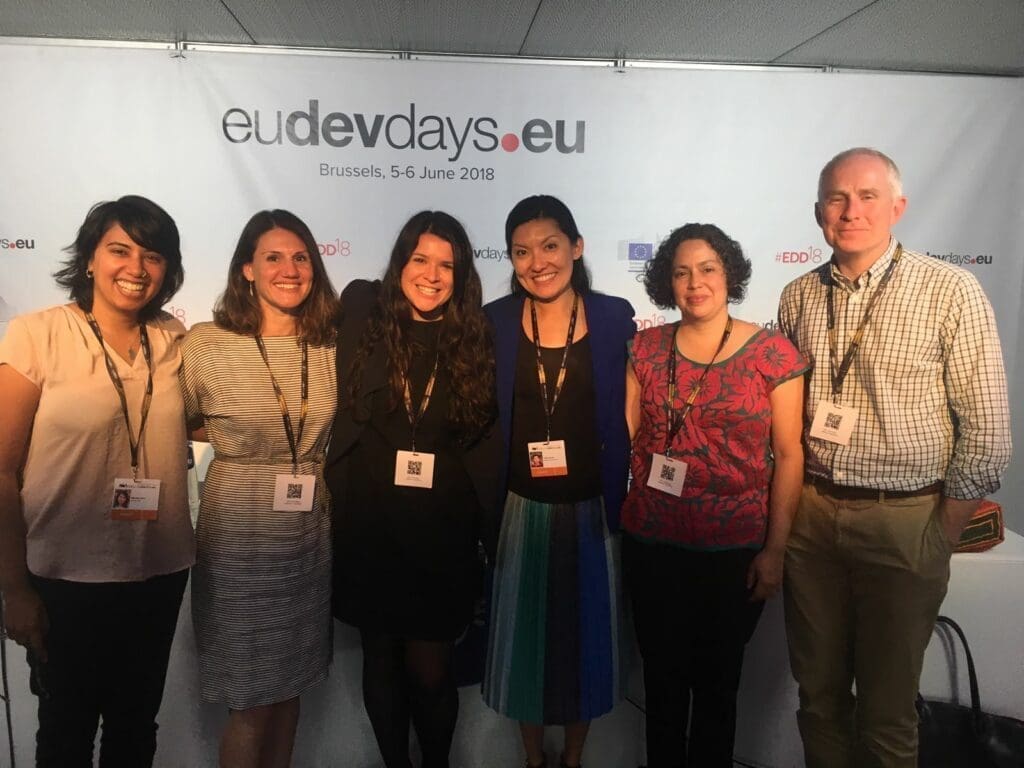
Brussels, 7 June 2018
“We need to change the narratives about the Human Rights Defenders”, said Liliana de Marco, director of Protection International, during the panel Woman on the Frontlines: How the Closing Space for civil society impacts women activists and Sustainable Development for Women and Girls, held last 6 June 2018 in the framework of the European Development Days (EDD).
This panel, organised by Protection International, Just Associates, the Fund for Global Human Rights, Mama Cash and Urgent Action Fund, aimed to generate dialogue on how the human rights and development communities can collectively respond to the global crackdown on civil society, and pushback on the restrictions women activists face that are hampering women’s equality and inclusion in sustainable development.
Liliana highlighted as well that “a narrative change needs to happen, in the context of smear campaigns portraying HRDs are anti-development. These narratives support perpetrators and shape civil society’s beliefs around WHRDs”.
In this sense, Zohra Moosa, executive director of Mama Cash, denounced that “WHRDs are stigmatized as “bad women”, acting “unappropriately”, shamed” and “their reputation is used to silence them and discredit them as a person in society”.
“Civil society groups and activists are facing an onslaught of stigmatising narratives from both state and non-state actors that paint those who dissent from the dominant economic model or critique harmful development projects as ‘anti-development’, ‘anti-national’, a ‘threat to economic security’, even as ‘terrorist sympathisers’ or ‘terrorists’”, added James Savage, Programme Officer – Enabling Environment for Human Rights Defenders at the Fund for Global Human Rights.
In order to end this dramatic situation faced by women human rights defenders, Marusia López, Senior Associate, Power and Protection of Women Activists for Just Associates, insisted on the need for mechanisms for the protection of human rights defenders that include a gender approach. She also highlighted that protection consists of creating a fairer and more equal society in which repression and private interests are not imposed and “as Berta Cáceres said, a world free of violence means rethinking the model of society we want to live in”.
In the same way, Liliana from PI, called on states to protect HRDs as it is their responsability. “We need policies with a preventive approach to protection, away from prescriptive norms, comprehensive public policies must include gender-based legal framework and address impunity. Protection is a responsibility of the state. There is a lack of confidence because protection mechanisms have flaws. We need to go much beyond the current mechanisms, and adopt a political shift. Protection mechanisms currently lack a more collective approach, to protect groups as a political subject, which entails strengthening social fabric and communities, in which women play a key role. 20 years since the declaration of HRDs and with the many reflections around rethinking protection, we must acknowledge that civil society has been at the forefront of protection strategies for HRDs”.
As James Savage said, “A free and open civil society which enjoys the rights to freedom of expression, assembly, and association is vital for achieving participatory, sustainable, and accountable development. Where civil society has enjoyed a more enabling environment, it has contributed to better access to education, healthcare, environmental improvements, debt relief and poverty reduction. However, in recent years the space for civil society to fulfil this essential function has been rapidly closing”.
Since 2012 there has been an acceleration of legal, defamatory, and physical attacks on civil society actors, and over 144 restrictive legislative initiatives, in 72 countries, have been proposed or enacted. Although there is increased discourse on this growing global crackdown, there has been a critical lens missing in much of it: how closing space for civil society is impacting grassroots women activists and leaders, and ultimately, sustainable development for women and girls. This panel discussion will address this discourse gap by bringing together diverse actors to discuss the specific restrictions and challenges women activists face, and the impact these then have on women and girl’s equality, inclusion and ability to participate in sustainable development.


